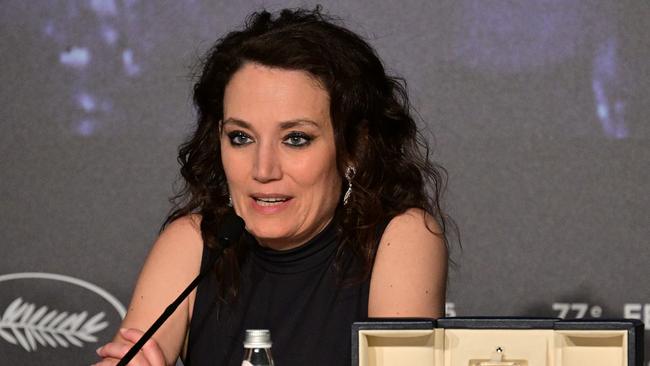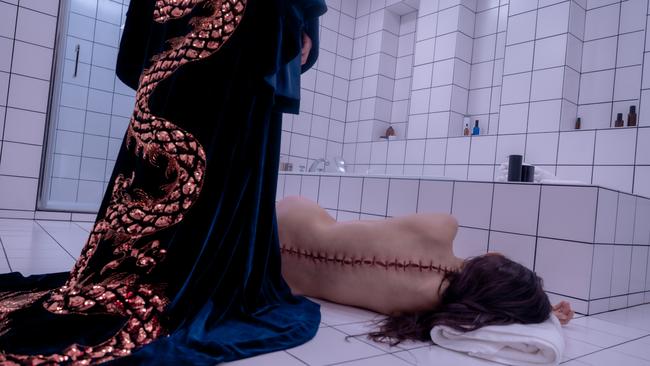Oscar buzz around Demi Moore’s ‘feminist body horror’ film
The star is enjoying high praise for her courageous portrayal of an ageing celebrity desperate to turn back time.

When Demi Moore sat in the audience at the awards ceremony of the Cannes film festival in May, many in the Grand Theatre Lumiere – probably including her – were anticipating that she would win for best actress for her astounding role in The Substance. But that didn’t happen. Now the 61-year-old is being touted for an Oscar nomination, and rightly so.
As the star of French writer-director Coralie Fargeat’s feminist body horror film, Moore has made a huge comeback, with her co-star Dennis Quaid calling her performance “the beginning of an incredible third act”.
Moore incredibly looks half her age and, together with her much younger co-star Margaret Qualley, performs full-frontal nudity, which attracted numerous headlines in Cannes. Still, the film has a lot to say and Moore was unafraid, explaining at the press conference how she was fully supported by Fargeat regarding “the level of vulnerability and rawness that was required to tell the story”. Fargeat ultimately won the festival’s screenwriting prize.
Moore plays Elisabeth Sparkle, a fading celebrity who is sacked by her sleazy boss (Quaid, who replaced Ray Liotta after Liotta’s death) on an aerobics TV show on her 50th birthday. She goes to gory extremes to remain youthful, taking a black-market drug, a cell-replicating substance that allows her to transform into a younger, best version of herself called Sue, played by Qualley. Sue becomes a huge hit on the show, although the substance is tricky because it only lasts for a week before the women have to change places. Then they must take turns, with each of them injecting the drug a week at a time. It’s a fascinating premise.
In Cannes, Moore declined interviews but I spoke to Fargeat the day after the film’s world premiere.
“Many actresses experience a slow moment in their careers when they reach a certain age,” she says. “I’m sure many other actresses could have been great, but Demi was my first choice for this part. She was bold enough to accept and was ready to jump into this tough, risky, exposing project.”

For Fargeat, 48, who has one previous feature to her credit, 2017’s Revenge, the film is about how women’s bodies are scrutinised, fantasised about and criticised in the public space. The nudity was essential in bringing her point across, both on the TV show and in Elisabeth’s quiet moments alone in her bathroom as she looks in the mirror, which Fargeat notes is when her body is not sexualised.
“From the beginning, the script was crystal clear – there was going to be a lot of nudity in the film. So it was important to discuss that very early in the casting process with both Demi and Margaret. They really came on board with that and understood that it was there to serve a purpose and it was meaningful in a way. I needed to have partners who wanted to tell the same story that I envisioned in a bold way. We had shared a lot in advance and were well prepared. I asked them to tell me if there was something that would make them uncomfortable, but there wasn’t anything.”
Fargeat had done her homework regarding Moore, who after appearing in Brat Pack films including St. Elmo’s Fire became the highest-paid Hollywood actress of the 1990s. She appeared in films including Ghost, the highest-grossing film of 1990 where she co-starred with Patrick Swayze, in 1992’s A Few Good Men alongside Tom Cruise, in 1993’s Indecent Proposal co-starring Robert Redford, in 1994’s Disclosure with Michael Douglas, and in 1996’s Striptease where she was the undisputed star – although the flop of the latter film led to a downturn in her career.
Interestingly, she had only been to Cannes once before, to support her then husband Bruce Willis at the 1997 premiere of The Fifth Element.
“When I first met Demi I had this image of the movie star, a very famous actress, but I didn’t know much about her,” Fargeat notes. “Before we decided to work together I read her autobiography (2019’s Inside Out, a New York Times bestseller) which is impressive. I came to understand how she went through everything on her own and how she had a tough life on many levels and made her own way. She had a strong will and was thinking out of the box and did surprising provocative feministic projects that were ahead of her time.
“I came to understand why she could take the risk to come and make my movie, because a bit later in her life, she also went through a very tough thing on a personal level with how she was viewed as a woman. So she was in her own process of wanting to overcome this, to find a way to feel good about herself. What I’m so happy about when I see her today is I feel like she became so much stronger in the past few years. She earned her place again. I was so happy to see her at the theatre after the incredible response at the premiere, because she deserved that so much. She’s really brave and she went for it. And it was a tough shoot. The prosthetic work alone took seven hours to prepare which left us with two hours to shoot on a given day.”

It was tough after filming too when The Substance, which was filmed in France in 2022 and was produced by Working Title’s Tim Bevan and Eric Fellner, was dropped by Universal Pictures, who usually distribute Working Title productions including the Bridget Jones films. The film was picked up by Mubi for the US, the UK and other countries and after its rousing Cannes 2024 premiere was sold to the rest of the world.
The Substance is, after all, a racy horror film with a lot of gore and violence, particularly at the end. Fargeat defends her film as a lover of the horror genre and as a feminist. She says the body horror genre is the perfect way to express the violence women endure from society, particularly from men, as well as the violence they inflict on themselves to achieve unrealistic beauty standards.
“My tool to express what I feel is my film, because when you start to talk about these issues, it’s very violent. As a writer I follow my instincts and the story came naturally in a kind of unconscious way. The French crew were all on board with my vision.
“I was also very happy to make conscious nods to my favourite horror films while always re-imagining it in my own way to create my own universe and to transform it.”
While watching the film you can spot her influences including The Fly, The Thing, The Elephant Man, The Picture of Dorian Gray, which she says is “a universal story of the human condition” and also the films of Paul Verhoeven. “He goes all the way and that’s really what I love to watch.”
“With genre films you can have fun and add some humour,” she says. “It allows the audience to bear the excess, to bear the extreme violence and to bear the graphic images. It’s something where they can release the pressure.”
Moore says the film was a challenge in the best way. “I look at material that pushes for things, that pushes me out of my comfort zone. And if something scares me a little bit, I usually know that there’s an opportunity which on the other side will make me a better person, and hopefully a better actor. I think that this really touched on so many themes that we all face, we all seek a certain sense of validation and belonging. And by Coralie doing it in a way that took us to the extreme, I think it really allows for you to kind of step into it in a totally unique way.”
The Substance screens at MIFF on August 14, 17 and 23. Releases in cinemas September 19 through Madman.




To join the conversation, please log in. Don't have an account? Register
Join the conversation, you are commenting as Logout